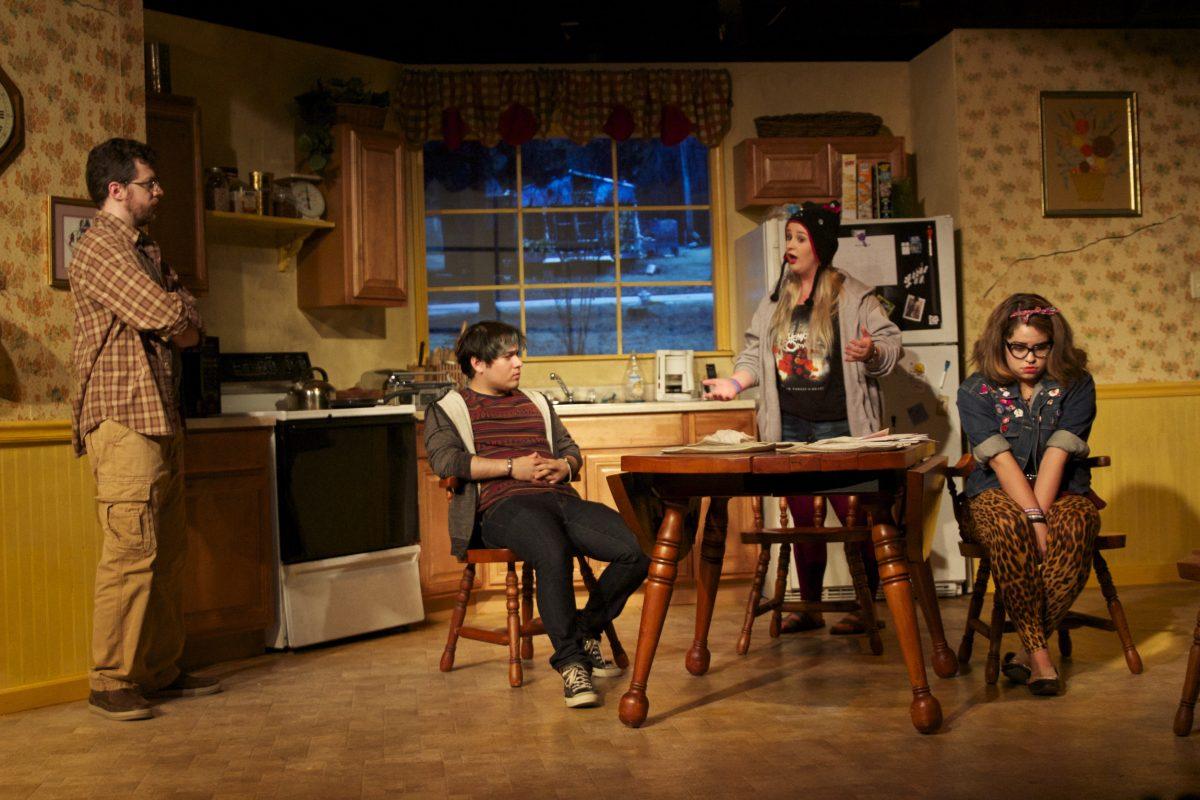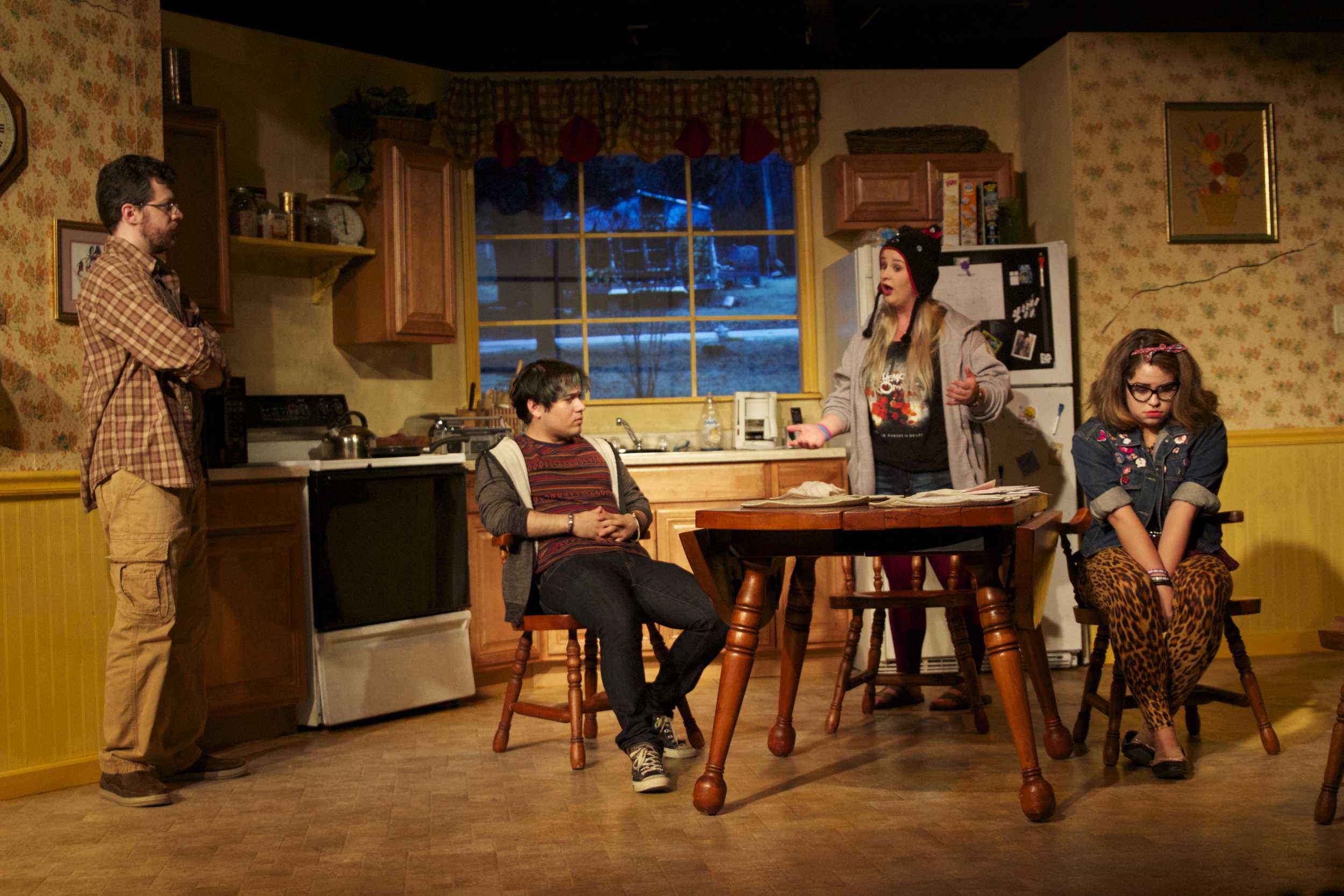STAR // Nicole Detmers ‘The Hummingbird Wars’ explores several modern-day adversities in an all-too-real family setting.
What is it that makes a play good? Is it solid performances of memorable characters? Is it an intriguing, relevant story that draws the interest of the audience? Or is it in the little things, such as the props or well-placed sound effects? Well, whatever makes a play good, the Sonoma State University Theater Department’s rendition of “The Hummingbird Wars,” directed by Judy Navas, includes all of the above.
Written by Carter W. Lewis, “The Hummingbird Wars” is an existentially-themed, socially conscious play that addresses a number of issues relevant to our everyday lives. A dark comedy, it follows the blunders of a disturbed American family who is struggling to keep their lives together in the face of a hostile, bureaucratic world defined by corporate interests and psychological turmoil.
Throughout the story, the home of this family is literally crumbling under threat of being demolished out of eminent domain. Warren (David O’Connell), a Medal of Honor recipient and veteran of the war in Afghanistan, suffers from PTSD and never leaves the house, except for when he stands outside and emptily stares at his family through the kitchen window. His wife Mel (Ashlyn Kelley) is a university professor and social activist who constantly worries and feels as if her own significance to the world is diminishing. Their ahead-of-his-years adolescent son, Pete (Carlos Rodriguez) has an unsettling obsession with guns, as well as trouble coping with the hardships of high school. His sister, Kate (Rosemarie Kingfisher), is a poet at heart, tormented by cyber harassment by her ex-boyfriend and terrified of the influence corporations seem to have over her life. Kate’s girlfriend Tracey (Renee Hardin) is arguably the wackiest character of the bunch. Tracey, who seems slightly schizophrenic, needs to take heavy medication in order to partially mitigate her eccentric and unpredictable behavior.
Hardin’s portrayal of this character is the most memorable, as she effortlessly transitions from one extreme emotion to the next in a very believable fashion. Truly though, all the actors seem comfortable with their characters and well-suited for their roles, and do a more-than-ample job of bringing this fictional family to life.
While “The Hummingbird Wars” doesn’t follow the typical formula of conflict, rising action, and eventual resolution, the play is absolutely stuffed with witty observations about our ever-changing and interconnected world.
During the opening scene, Pete laments the fact that he has to go to school, and lambasts the public education system, which he sees as an absurd arrangement of pointless memory exercises and never-ending popularity contests. Later in the story, when a water main breaks near the house, the father, Warren, notes that it takes the bureaucratic say-so of the government, a private contractor, and an insurance company to simply turn a knob.
Persisting throughout this play is the theme of entirely apathetic, bloated organizations surrounding the middle class family on all sides, crushing them with nigh systematic efficiency. What does one do when their medical bills cost more than the mortgage, when their personal information is being spread all over the internet, when their FDA-approved food is unsuitable to eat, when their house is flooding, and their family is gradually losing themselves to the madness? There are many relevant issues that “The Hummingbird Wars” explores, that it’s hard to remember them all.
Beneath the thick jungle of corporate greed and psychological trauma that dominate the lives of the characters, there is a looming existential crisis that the whole family shares. Impending doom is constantly mentioned, whether it’s through the planned demolition of the house or the death of a hummingbird.
All the main characters struggle with a mutual loss of agency, all of them being treated like dirt in a debilitating world of manipulative marketing strategies, pre-recorded telephone operators, and ever-encroaching reasons to despair.
While this play was obviously written for contemporary audiences, these thematic qualities make the play more universally relevant, as all people of all eras have to deal with the unstoppable disintegration of everything around them.
In short, “The Hummingbird Wars” is clever, socially relevant, disturbing and hilarious all at once. While there are some imperfections, such as some misleading character development in the opening scene and a somewhat crammed stage, the overall production is well done and worthy of appreciation.





![[Both photos courtesy of sonoma.edu]
Ming-Ting Mike Lee stepped in as the new SSU president following Sakakis resignation in July 2022](https://sonomastatestar.com/wp-content/uploads/2024/04/CC4520AB-22A7-41B2-9F6F-2A2D5F76A28C-1200x1200.jpeg)



























